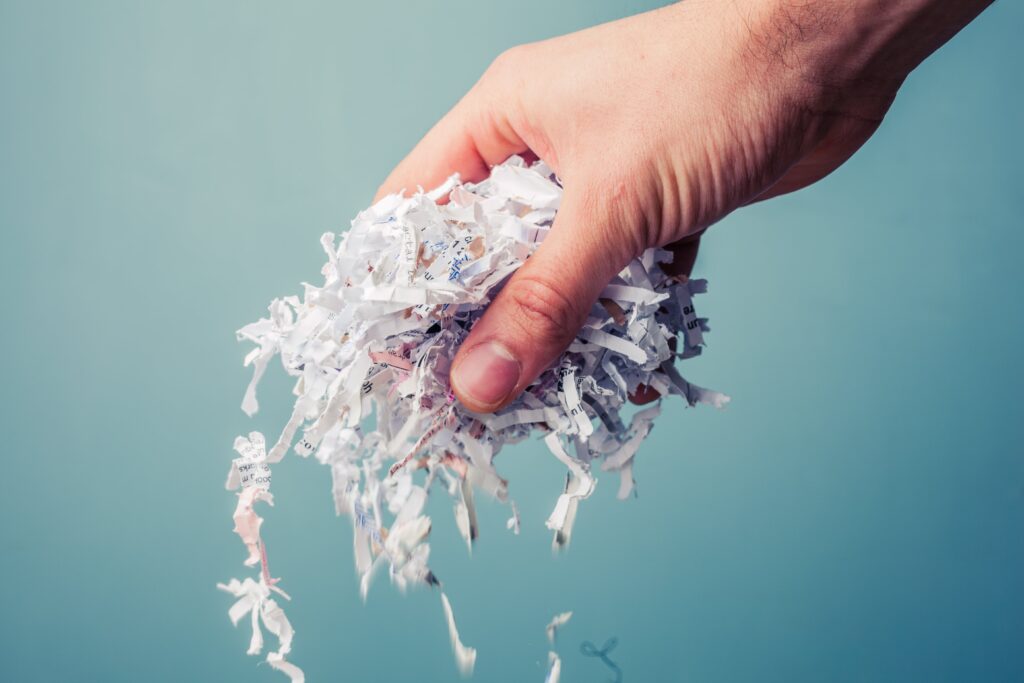While there’s long been talk of a paperless society, modern life still generates a hefty paper trail. Some of the papers might be harmless, but some are sensitive enough to be potentially damaging. Proper shredding ensures that paperwork with sensitive data won’t fall into the wrong hands. Knowing when to shred business documents is all in a day’s work.

When to Shred Business Documents
Every business generates at least some paperwork that contains sensitive or proprietary information. The amount of sensitive documentation and the level of sensitivity will vary depending on various factors, including the size of your company, the industry that you are in, and the products or services that you offer. However, some things are universal.
Failure to properly dispose of sensitive information creates real hazards. As The Motley Fool notes, it could set the stage for industrial espionage, identity theft, and fraud. It might also lead to the exposure of your company’s internal strategies, which could give your competitors a huge advantage. Or, it could reveal unflattering or embarrassing data that could lead to a public relations nightmare, legal troubles, or both. Safely disposing of sensitive data by shredding it is simply good business. However, there’s a right time for everything. How do you know when to shred business documents? Keep reading.
Contracts and Legal Documents
There are certain items that you should plan on retaining permanently. They should never be tossed in the trash or shredded. These include anything related to the following:
- Corporation and LLC documents
- Deeds or titles for property
- Trademark, copyright, and patent paperwork
- Contracts and related attorney correspondence
- Lawsuits or legal claims
Tax Records
LegalZoom suggests keeping your tax returns and all supporting documentation for at least seven years. After that, you should be safe to shred the supporting documentation. However, you’ll want to retain the actual tax returns in case they’re needed to assist with future returns. In addition, if you have any receipts related to assets, like receipts related to office renovations, you’ll want to hold onto those for as long as you own the asset.
Financial Records
Credit card and bank statements should be shredded after a year. In-house documents produced to track income, profit and loss, or cash flow should be retained. You may need them to obtain credit.
Human Resources Records
Hiring, firing, training, promoting, and arranging for other benefits can generate a lot of paperwork, and much of it will include sensitive information. According to LegalZoom, employers are legally required to keep certain records for three or five years. Lawyers often suggest holding onto employment documents for seven years after an employee’s exit from the company. Paperwork for anyone not hired should be retained for three years. Records for worker’s compensation cases should be held for ten years. Then, the records can be shredded for safety.
Business Property
Whether they’re for real estate, vehicles, or equipment, the records for business property are handy when you need to figure out depreciation, amortization, and depletion deductions. While the IRS only requires you to hold onto the records for a year after the disposal of the property, most experts advise holding onto your records for at least seven years after you dispose of the property.
Miscellaneous Sensitive Paperwork
Any paperwork that your business has produced might require proper disposal. When a document has outlived its usefulness, don’t simply pitch it in the trash. Instead, ask yourself if it should be shredded. If it contains any of the following for you or anyone else, send it for shredding:
- Credit card numbers
- Social Security numbers
- Banking information
- Email addresses
- Policy numbers
- Driver’s license numbers
- Confidential or strategic data
Being able to dispose of paperwork that contains sensitive or confidential information quickly and efficiently is essential, so having a shredder that can keep up with your office’s arsenal just makes sense. Do you dread the thought of bringing one more piece of equipment into the picture? Don’t let tech terrorize you. Turn to CPI Technologies.